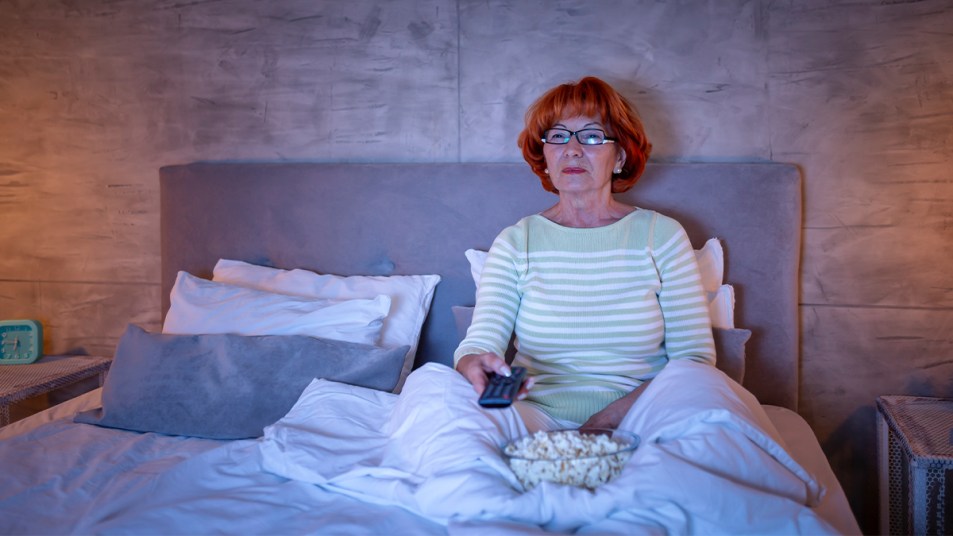Like to Snack While Watching TV in Bed at Night? You May Want to Reconsider

It’s tempting to curl up in bed to watch your favorite movie with a bowl of popcorn and chips, but you may want to think twice before hitting the hay with a snack. Eating late at night, especially in your bed, may lead to weight gain and make it harder to fall asleep once you turn off Netflix.
Eating a snack or any type of meal as you wind down can negatively affect your metabolism and put you at risk for obesity. A study published in BMC Public Health looked at the effects of late night eating on 8,153 adult men and women aged 40 to 54-years-old. It found that both male and female participants exhibited this behavior were at a higher risk for developing dyslipidemia, a health condition that can be caused by obesity and can increase your risk of type 2 diabetes, hypothyroidism, and chronic kidney disease.
Additionally in women, they found a link between late night eating and metabolic syndrome — which is caused by having high blood pressure and blood sugar along with low levels of “good” cholesterol. This syndrome can lead to diabetes, heart disease, and stroke due to a buildup of fatty deposits in the arteries also known as atherosclerosis.
It’s safe to say that establishing consistent meal times and avoiding snacking at odd hours (especially at night) can reduce your risk of developing any serious health issues. That bowl of popcorn or piece of a brownie might be calling your name before bed, but over time if this becomes a pattern then it can impact your overall well-being.
In addition to your long-term health, snacks in bed can throw a wrench in your plans to have a good uninterrupted night of rest. Research published in the Journal of Clinical Sleep Medicine found that food intake during the period when you’re getting ready for bed can have negative effects on your quality of sleep.
The study’s researchers believed that one of the factors causing this is the overactivity of the digestive tract when there’s excessive food intake prior to going to sleep. This can bring about physical discomfort within your stomach and make it harder to fall asleep.
Certain foods and drinks can also trigger your digestive system to work harder as you’re sleeping, which is why the experts at Sleep Foundation suggest staying away from caffeinated beverages like soda and coffee as well as spicy foods before bed. Making sure that you have a filling dinner so that you’re not as likely to excessively snack afterwards can help keep your sleep pattern right on track.
And finally, your bed should be the coziest place to lay down after a long day. Keeping it clean will help create a comfortable environment for you to rest, another important factor for sleep health. However, with late night snacking there’s a possibility for crumbs and spills to get on your sheets — making it the perfect breeding ground for germs and bacteria.
An easy way to prevent this from happening is to make your bed only be a place to rest and relax rather than doubling as a place to eat snacks or meals. Also, to make sure that your sheets and pillow cases stay clean and sanitized, you should wash them every week, and don’t forget to show your duvet cover some love by washing it at least every month.
The key to a consistently good night of sleep is cutting out any unnecessary habits like snacking too late in bed. It might seem you’re giving up something, but you’ll wake up more refreshed and can treat yourself to a delicious breakfast to start the off day right.












